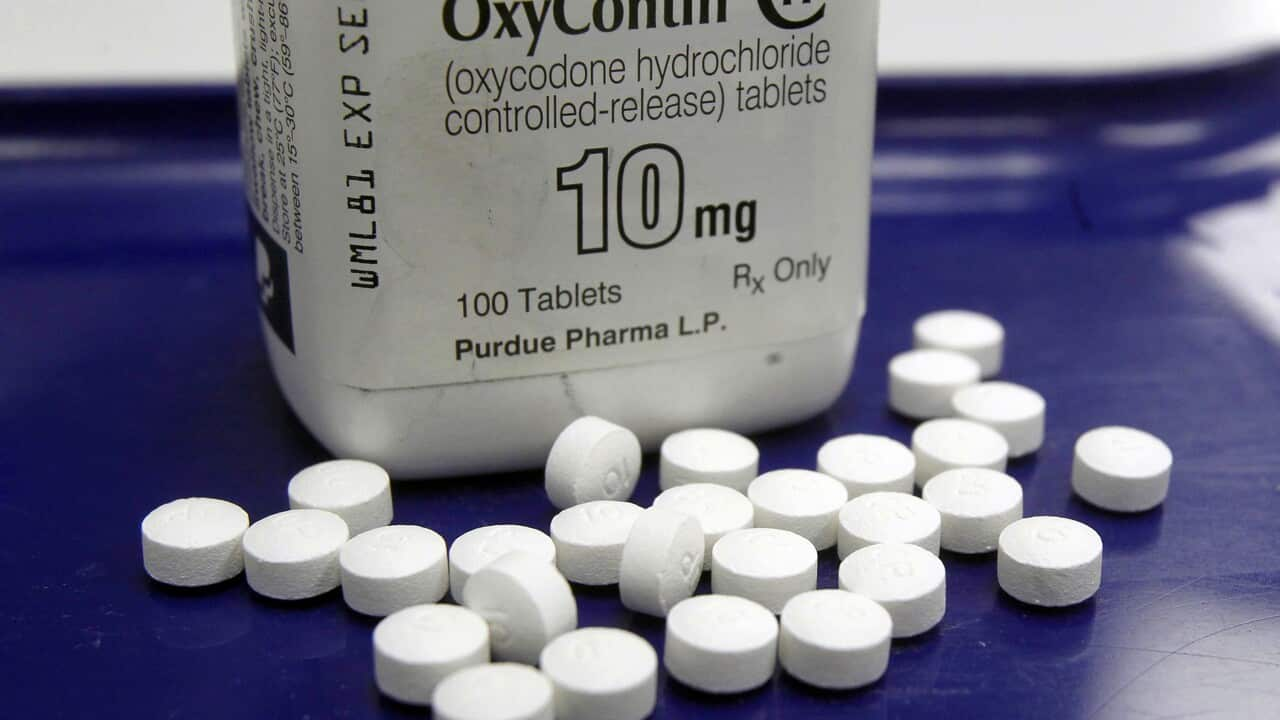Key Points
- OxyContin maker Purdue Pharmacy’s bankruptcy settlement has been blocked by the US Supreme Court.
- The settlement, in the billions of dollars, would have given legal protection to the family behind the company.
- The Sacklers have expressed regret that OxyContin “became part of an opioid crisis” in the US, but denied wronging.
The US Supreme Court has blocked OxyContin maker Purdue Pharma’s bankruptcy settlement that would have shielded its wealthy Sackler family owners from lawsuits over their role in the United States’ deadly opioid epidemic.
The 5-4 decision reversed a lower court’s ruling that had upheld the plan to give Purdue’s owners immunity from civil litigation in exchange for paying up to $US6 billion ($9 billion) to settle thousands of lawsuits accusing the company of unlawful misleading marketing of OxyContin, a powerful pain medication introduced in 1996.
US President Joe Biden’s administration had challenged the settlement as an abuse of bankruptcy protections meant for debtors in financial distress, not people like the Sacklers who have not filed for bankruptcy.
Conservative justice Neil Gorsuch wrote the ruling, which was joined by fellow conservative justices Clarence Thomas, Samuel Alito and Amy Coney Barrett, as well as liberal justice Ketanji Brown Jackson.
“The Sacklers have not filed for bankruptcy and have not placed virtually all their assets on the table for distribution to creditors, yet they seek what essentially amounts to a discharge,” Gorsuch wrote.
“They hope to win a judicial order releasing pending claims against them brought by opioid victims. They seek an injunction ‘permanently and forever’ foreclosing similar suits in the future. And they seek all this without the consent of those affected.”
Purdue filed for bankruptcy in 2019 to address its debts, nearly all of which stemmed from thousands of lawsuits alleging that OxyContin helped kickstart an opioid epidemic that has led to more than half a million US overdose deaths over two decades.
At issue in the case was whether US bankruptcy law lets Purdue’s restructuring include legal protections for the members of the Sackler family, who have not filed for personal bankruptcy.
The company estimates that its bankruptcy settlement, approved by a U.S. bankruptcy judge in 2021, would provide $10 billion in value to its creditors, including state and local governments, individual victims of addiction, hospitals and others who have sued the company.
The Biden administration and eight states challenged the settlement. All the states dropped their opposition after the Sacklers agreed to contribute more to the settlement fund, but the US Trustee – the Justice Department’s bankruptcy watchdog —-and some individual opioid plaintiffs maintained their opposition.
The US Supreme Court has rejected a nationwide settlement with OxyContin maker Purdue Pharma that would have shielded members of the Sackler family who own the company from civil lawsuits over the toll of opioids but also would have provided billions of dollars to combat the opioid epidemic. Source: AP / Seth Wenig
Purdue issued a statement expressing disappointment in the court’s decision.
“Today’s ruling is heart-crushing because it invalidates a settlement supported by nearly all of our creditors – including states, local governments, personal injury victims, schools and hospitals – that would have delivered billions of dollars for victim compensation, opioid crisis abatement, and overdose rescue and addiction treatment medicines,” it said.
Justice Brett Kavanaugh wrote a dissenting opinion that was joined be fellow conservative Chief Justice John Roberts, and liberal Justices Sonia Sotomayor and Elena Kagan. “Today’s decision is wrong on the law and devastating for more than 100,000 opioid victims and their families,” Kavanaugh wrote.
A group comprising more than 60,000 people who have filed personal injury claims stemming from their exposure to Purdue opioid products had told the Supreme Court they support the settlement, including legal immunity for members of the Sackler family.
But several state attorneys general issued statements praising the ruling, with some saying that it would bring Purdue back to the negotiating table.
“Purdue and the Sacklers must pay so we can save lives and help people live free of addiction,” said Josh Stein, attorney-general of North Carolina.
“If they won’t pay up, I’ll see them in court.”
Purdue, in its statement, said the company “will immediately reach back out to the same creditors who have already proven they can unite to forge a settlement in the public interest”.
In a statement, members of the Sackler family said they “remain hopeful about reaching a resolution that provides substantial resources to help combat a complex public health crisis.”
In upholding the settlement in May 2023, the Manhattan-based 2nd U.S. Circuit of Appeals concluded that federal bankruptcy law permits legal protections for non-bankrupt parties like the Sacklers in extraordinary circumstances.
It ruled that the legal claims against Purdue were inextricably linked to claims against its owners, and that allowing lawsuits to continue targeting the Sacklers would undermine Purdue’s efforts to reach a bankruptcy settlement.
The Supreme Court in August 2023 paused bankruptcy proceedings concerning Purdue and its affiliates when it agreed to take up the administration’s appeal of the 2nd Circuit’s ruling.
Lawsuits against Purdue and the Sackler family members accused them of fuelling the opioid epidemic through deceptive marketing of its pain medication.
The company pleaded guilty to misbranding and fraud charges related to its marketing of OxyContin in 2007 and 2020.
Members of the Sackler family have denied wrongdoing but expressed regret that OxyContin “unexpectedly became part of an opioid crisis.

